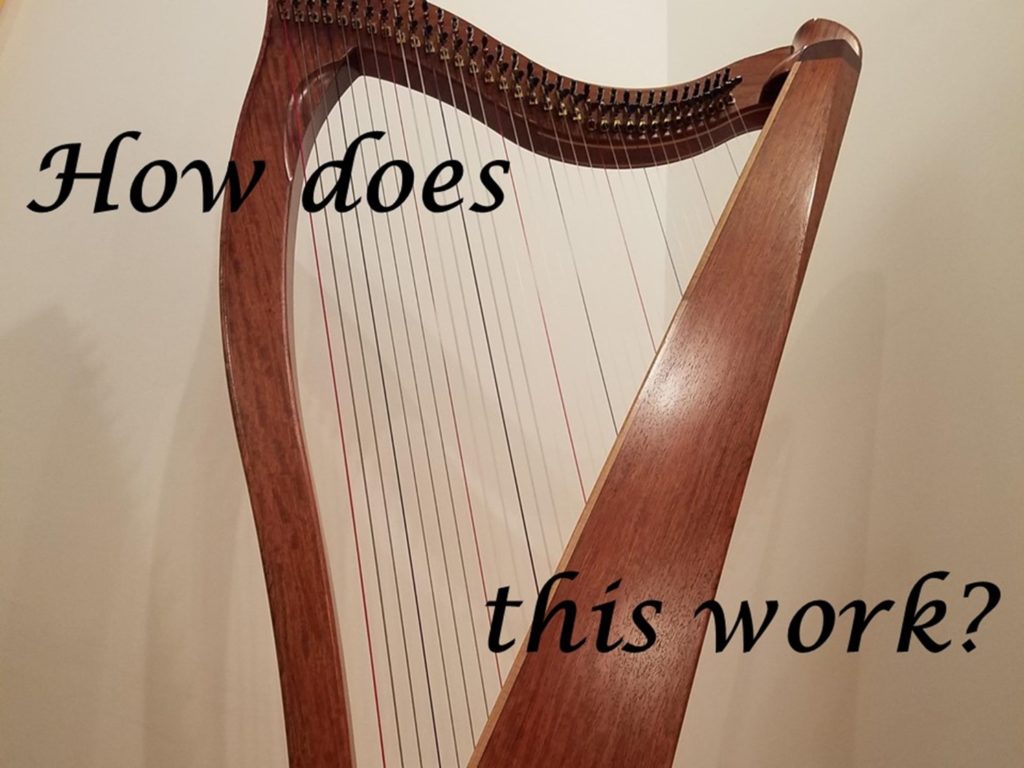Today, I’m sitting below a poster with a quote from Marcel Proust,
”The voyage of discovery is not in seeking
new landscapes but in having new eyes.”
It dovetails nicely with some of your comments to last week’s post – thanks so much for those!
DB brought up the concept of the “beginner’s mind”. This is the concept that a beginner may acknowledge that they don’t know much. Beginners are open to learning and new experiences and don’t cloud their vision with preconceptions. They don’t think they’re experts. You might remember this phase from your early harp life?
 DB went on to say, “it seems that what separates the “masters” from the dilettantes is a maintenance and mastery of the basics, through a strong curiosity of what “new” thing they might or might not discover in that practice.”
DB went on to say, “it seems that what separates the “masters” from the dilettantes is a maintenance and mastery of the basics, through a strong curiosity of what “new” thing they might or might not discover in that practice.”
KB suggested that, “Paying close attention to what causes something to go wrong is essential to avoiding the same problems repeatedly. Issues with hand position, fingering, placement, focus, etc. lead to mistakes. Find the underlying issue, then fix it through targeted practice. It works for both my playing and my knitting!”
This too is something we often do that appears to move us forward but actually holds us back – we are often satisfied with a “fix” but don’t do the additional work to find the underlying cause. Without doing the technique work, you might never find that little nuance you need to get the fingering down or to drop your shoulder or read just a little ahead of where your playing or any of the other little things that are holding you back.
DB pointed out that, “in many ways the lesson seems to be rooted in always finding time, and maintaining a strong curiosity in practicing the basics, no matter how far away from the basics, we think we’ve progressed.” How can you do that in your everyday practice? Here are six ideas to move you forward:
- You can acknowledge that you will learn things at different rates, that some things will be harder than others to you, that you can only calmly evaluate and learn. You can only take it one step at a time.
- You can stop with the comparisons! You should not be playing like everyone around you. And remember that, like high school, facebook, and reality tv, nothing is what it seems when you look around you – just because the person next to you is sailing through something with which you are struggling doesn’t mean that they didn’t aslo struggle (just earlier) – it only means that you didn’t see it!
- Actually LISTEN to the feedback you get – the best teachers use the praise and guide approach – they will provide actual praise (from which you can learn what you are doing well in terms of performance and practice) and guidance (from which you can learn what you need to do more of, learn how to do, or learn what to stop doing).
- Remain a beginner – ask questions. Do not assume that you know something just because you have been doing it. There is always something to learn that may (or may not) be good for you to incorporate.
- Ignore what doesn’t fit. Some of the best advice I received early in my harp life was from my teacher at the time who told me that I should play what I liked and leave the rest on the floor. Her point was sound – if you don’t like classical music, don’t play it! (NB this is not the same as, “it’s hard and I don’t want to do the work!”. But you are more likely to work hard if you’re mostly playing music you like. Don’t cut yourself off from a genre just because it’s challenging – learn what it can teach you and port that to what you do love).
- Don’t worry! We (especially adults) worry that we’re not getting better, that we’ll never be good enough, that everyone else is making more progress. Let-It-Go! Focus on you, what you need to learn, what you want to learn. There is no need to train to go to Conservatory if your goal is to have a nice set of music to play for your friends and family. And if your goal is to go to Conservatory, then focus on the necessary development – but either way, channel your energy into learning, asking questions, and enjoying. Don’t waste it worrying.
Keep working on being a beginner – question, wonder, enjoy! Discover the landscape with new, beginners eyes.